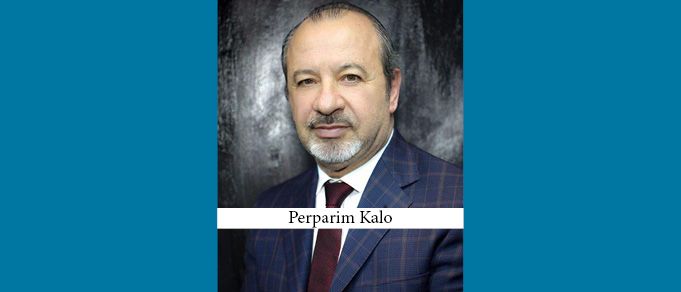The Buzz in Albania, according to Perparim Kalo, the Managing Partner at Kalo & Associates, is not as bleak as many who listen to the complaints of his countrymen might believe. "It is common to complain in the Balkans,” he says with a smile. "We usually consider positive trends or developments as less important than failures. It is a kind of a complaining culture.”
Still, that doesn’t mean everything is sunny in the legal market, Kalo says. "We hear from all our peers in the Balkans,” he says, "that although there are new business cases, those cases do not bring considerable profit.” In particular, he says, this is due to pressure on fees; a service that generated 50 thousand euros a few years ago may only generate 15 now. "Of course it’s temporary," he says, “and there is hope that it won’t last for long.”
Kalo says that the fee pressure didn’t happen overnight, but grew gradually, becoming much stronger over time. He doesn’t tie it to the global financial crisis, which he says "was not so evident here, because our economy has been rather closed.”
According to Kalo, although his firm, like other leading firms in Albania, benefits from strong relationships with international counterparts, the fees they receive from referrals are not high, "most probably due to fee arrangements with clients when they obtain global mandates." Another factor affecting fees, he says, is the what he describes as "market fragmentation." According to Kalo, "new firms are popping up and taking some cases and projects, so there seems to be a wider distribution of fees nowadays.”
Still, he says, he’s not unduly concerned, "as traditional firms know how to keep their positions, so they are not affected so much and therefore do not have to complain."
Kalo believes important projects will arrive soon, "and those that have been in the pipeline will resume." Business has been slower this year than last year, he says, "because it was an election year. When you have elections projects, including public works, slow down or even stop for a while. They usually accelerate on the brink of elections, and then stop while new institutions are formed or reconfirmed by the victorious political forces." In any event, the slowdown over the past few years hardly means the economy has ground to a halt. "In terms of GDP growth the country still has some good indicators confirmed by the international agencies, so it may stay in the region of 3.5 percent, which is good compared to the rest of the region. But we were used to 6% for almost a decade, so it’s a slight drop.”
Despite the temporary slowdown, Kalo says that some areas like IP/IT are getting stronger. "We have seen an increase of activities that require protection, like copyright, trademark, and patent.” He says, “we are frequently hired by big proprietors to pursue infringements — there’s a lot of that going on here.”
In addition, he says, there are "more Chinese and Turkish investors are on the horizon,” who are interested in "hydro power generation and natural resources, mining and infrastructure, and also the oil sector.” He refers to the 2016 takeover of the country’s biggest offshore reserve by Geo-Jade Petroleum for EUR 440 million, which his firm assisted with. “And it appears that the Chinese want to invest more,” he says. "In port and airport infrastructure, for example. They have projects in Serbia, Croatia, and across the whole region.” The Turks are active as well, he says, in the banking, telecommunications, and power distribution sectors. “They have several big cases in hydro power concessions. They have construction, cement, steel, airport. They have many things."
And the elections — which took place on June 25, with the victorious Socialist Party of Albania party forming its government in September — are over; Kalo says: “we’re hoping that things will move ahead soon.” Indeed, as the new government doesn’t need a coalition party for the first time in many years, “they are able to approve any projects, of any size, such as a new port worth billions by a large consortium, a new railway project worth EUR 90 million by the EBRD and EIB; a new highway worth EUR 250 million; a PPP for the motorway connecting Albania and Kosovo; a PPP for operating several laboratories of hospitals to a private company; as well as other projects involving mining, hydropower, and solar plants."
Such projects would only be facilitated by the country's candidacy for the EU, according to Kalo. "Let’s hope — it depends very much on the political will and behavior of the government — that we get the invitation to become a candidate country for EU membership, and of course if we’re accepted the EU would be more supportive in investments for the improvement of infrastructure so the country can be more comparable to other member countries”
Thus, despite the country's cultural tendency towards complaining, Kalo says he is optimistic. "I think I can see the glass half full for 2018. Because we cannot go back anymore. We will go forward anyway. And the country has a lot of potential. We see more tourists coming, as the country becomes more attractive. Agriculture is another sector with great potential. The potential of the country is great also because of a fantastic geographical location and good assets, including human and natural resources. It would be a real pity if, 27 years after the opening in the 90s, we failed to take advantage of our values at this moment in time"


















